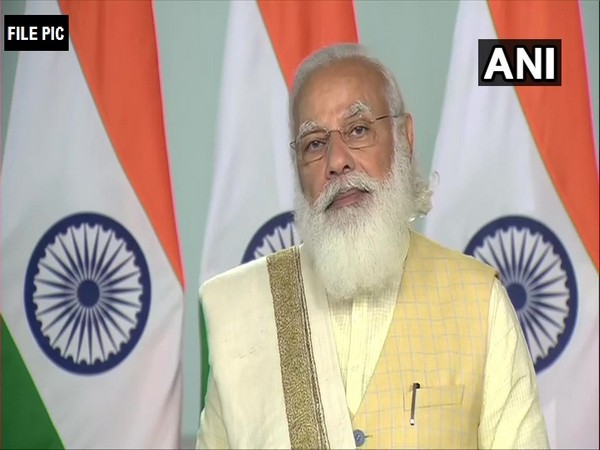COVID-19 presented opportunity to reshape world order:Modi, says India 'walked the talk' during pandemic

- Country:
- India
Pitching for global efforts to defeat COVID-19, Prime Minister Narendra Modi on Tuesday said the pandemic has presented an opportunity to reshape the world order and create systems to address the problems of today and challenges of tomorrow, and highlighted India's efforts in protecting its people as also supporting pandemic response efforts of others in its own ''humble way''.
Asserting that mankind will not be able to defeat the pandemic unless ''all of us, everywhere, regardless of the colour of our passports, come out of it'', Modi said hope matters as much to the citizens of the richest countries as it does to the less fortunate.
''During this pandemic, in our own humble way, within our own limited resources, we in India have tried to walk the talk. We have tried to protect our own 1.3 billion citizens from the pandemic. At the same time, we have also tried to support pandemic response efforts of others,'' the Prime Minister said in his inaugural address at Raisina Dialogue, held virtually.
Noting that this year, despite ''many constraints'', India supplied vaccines to over 80 countries, he said,''...we will continue to share our experiences, our expertise and also our resources with the entire Humanity in the fight against the pandemic.'' Modi's comments come amidst criticism by several opposition leaders that the government was exporting COVID-19 vaccines to many countries despite a huge surge in India.
During an interactive session at the conference, External Affairs Minister S Jaishankar also talked about India's 'vaccine maitri' approach to ensure equitable access to COVID-19 vaccines, asserting that equitable access (to vaccines) was ''critically important'' to defeat the virus. The Prime Minister also underlined the need to think of the entire humanity and not merely of those who are on ''our side of the borders'', and said humanity as a whole must be at the center of the thinking and action.
''The COVID-19 pandemic has presented us an opportunity to reshape the world order, to reorient our thinking. We must create systems that addresses the problems of today and challenges of tomorrow,'' he said.
Talking about protecting the globe, Modi said,''we may be used to having Plan A and plan B, there is no Planet B, only Planet Earth. And so we must remember that we hold this planet merely as trustees for our future generations.'' President of Rwanda Paul Kagame and Prime Minister of Denmark Mette Frederiksen also spoke at the event.
Noting that this edition of Raisina Dialogue was taking place at a ''watershed moment in human history'', Modi said the global pandemic has been ''ravaging'' the world for over a year and that the last such global pandemic was a century ago.
''Although humanity has faced many infectious diseases since then, the world today is under-prepared to handle the COVID-19 pandemic. Our scientists, researchers and industry have answered some questions,'' he said.
Modi said though many solutions have emerged to many questions relating to the pandemic and many more are yet to come. But as global thinkers and leaders we must ask ourselves some more questions, he added.
''For over a year now, the best minds of our societies have been engaged in battling this pandemic. All the governments of the world at all levels are trying to contain and control this pandemic,'' Modi said.
''Why did it come to this? Is it perhaps because in the race of economic development the concern for welfare of humanity has been left behind,'' he said.
The Prime Minister mentioned how India encouraged a coordinated regional response to the crisis and shared medicines and protective equipment with over 150 countries last year. On exporting vaccines to other countries, he said, ''we know that the supplies have been modest. We know that the demands are huge. We know that it will be a long time before the entire humanity can be vaccinated.'' Modi also mentioned the ''horrors'' of the first and second World War saying they compelled the emergence of a new world order. ''After the end of the second world war, over the next few decades many structures and institutions were created but under the shadow of the two wars they were aimed at answering only one question, how to prevent the Third World War,'' he said.
Modi said that it was the wrong question and as a result all the steps taken were like treating a patient symptoms without addressing the underlying causes. ''Or to put it differently, all the steps taken were to prevent the last war not the next one. In fact, while humanity has not faced the Third World War, the threat of violence has not reduced in people's lives,'' he said. ''With a number of proxy wars and unending terror attacks, the prospect of violence is ever present,'' he added.
The right questions could have been, Modi said, ''Why do we have famines and hunger? Why do we have poverty? Or most fundamentally why can't we cooperate to address problems that threaten the entire Humanity?'' Organised by the Observer Research Foundation (ORF), a think-tank, in partnership with the Ministry of External Affairs, Raisina Dialogue is India's premier conference on geopolitics and geo-economics, and its sixth edition is being held from April 13 to 16. PTI MPB PYK PYK
(This story has not been edited by Devdiscourse staff and is auto-generated from a syndicated feed.)
ALSO READ
PM Modi pays tributes to Jagjivan Ram
Modi govt was 'dragged into' providing free COVID-19 vaccinations by oppn: Cong
"People want Modi ji to become Prime Minister again": Telangana BJP President G Kishan Reddy
PM Modi to visit Assam on April 17, Amit Shah on April 7-8: Minister Jayanta Malla Baruah
Continuing geopolitical tensions pose upside risks to commodity prices: RBI Guv.










